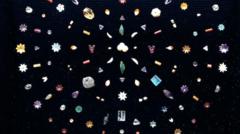The jewels, comprising nearly 1,800 pearls, rubies, sapphires, and gold sheets, are set to be auctioned on Wednesday by Sotheby's in Hong Kong. These relics, discovered in 1898 by William Claxton Peppé during an excavation at Piprahwa—believed to be the Buddha's birthplace—were hidden away for over a century in a British family collection. Their connection to the Buddha is profound: bone fragments indicating his remains were also excavated alongside these treasures. Nicolas Chow, the head of Asian Art at Sotheby's, lauds the finding as one of history's most significant archaeological achievements. However, with the looming auction, experts voice ethical concerns about selling artifacts tied to India's spiritual lineage.
Historians assert that the jewels rightfully belong to the descendants of Buddha's clan as well as to the global Buddhist community. The question remains: can such deeply sacred relics be treated like commodities in the marketplace? Scholar Naman Ahuja and others voice skepticism regarding the ethical justification for auctioning these items, called "custodianship" into question. Chris Peppé, the great-grandson of the original excavator, expressed that prior attempts to donate the jewels met obstacles, positing the auction as the most transparent option for their new stewardship.
Concerns among Buddhist leaders also intensify about the morality of trading in human remains and artifacts. Amal Abeyawardene from the British MahaBodhi Society remarks on the Buddha’s teachings against taking what is not offered. Together, these voices suggest that the auction disregards a historical and spiritual context in which the relics were originally revered. The Peppé family has sought to understand their heritage more thoroughly, stating that the auction is a means to ensure the jewels return to a context where they are valued respectfully.
Despite their commercialization, the jewels had been showcased in significant exhibitions, increasing their public visibility and cultural interest. However, some scholars argue that the actions taken are an extension of colonial violence, further objectifying sacred relics. Chris Peppé maintains that most Buddhists do not perceive the jewels as corporeal relics, countering academic views that attempt to redefine their status. The family hopes that the auction will facilitate a respectful transition of ownership to those who prioritize their veneration.
As discussions about cultural appropriation and the appropriate care of sacred artifacts continue to flourish, the fate of the Buddha's jewels raises critical questions about how nations reckon with their histories, the ethical frameworks surrounding cultural heritage, and the responsibilities of stewards in navigating the complex legacy of colonialism. The auction may serve as a pivotal moment in addressing these long-standing issues.
Historians assert that the jewels rightfully belong to the descendants of Buddha's clan as well as to the global Buddhist community. The question remains: can such deeply sacred relics be treated like commodities in the marketplace? Scholar Naman Ahuja and others voice skepticism regarding the ethical justification for auctioning these items, called "custodianship" into question. Chris Peppé, the great-grandson of the original excavator, expressed that prior attempts to donate the jewels met obstacles, positing the auction as the most transparent option for their new stewardship.
Concerns among Buddhist leaders also intensify about the morality of trading in human remains and artifacts. Amal Abeyawardene from the British MahaBodhi Society remarks on the Buddha’s teachings against taking what is not offered. Together, these voices suggest that the auction disregards a historical and spiritual context in which the relics were originally revered. The Peppé family has sought to understand their heritage more thoroughly, stating that the auction is a means to ensure the jewels return to a context where they are valued respectfully.
Despite their commercialization, the jewels had been showcased in significant exhibitions, increasing their public visibility and cultural interest. However, some scholars argue that the actions taken are an extension of colonial violence, further objectifying sacred relics. Chris Peppé maintains that most Buddhists do not perceive the jewels as corporeal relics, countering academic views that attempt to redefine their status. The family hopes that the auction will facilitate a respectful transition of ownership to those who prioritize their veneration.
As discussions about cultural appropriation and the appropriate care of sacred artifacts continue to flourish, the fate of the Buddha's jewels raises critical questions about how nations reckon with their histories, the ethical frameworks surrounding cultural heritage, and the responsibilities of stewards in navigating the complex legacy of colonialism. The auction may serve as a pivotal moment in addressing these long-standing issues.


















